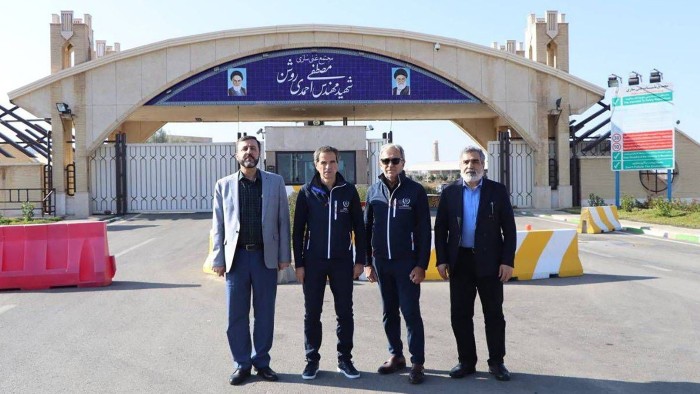Unlock the Editor’s Digest for free
Roula Khalaf, Editor of the FT, selects her favourite stories in this weekly newsletter.
Iran has discussed capping its stockpile of highly enriched uranium with the UN’s nuclear watchdog and has begun “preparatory measures” towards such a move, according to the International Atomic Energy Agency.
The IAEA said in a report obtained by the Financial Times that during high-level meetings last week, the agency and Iranian officials discussed “the possibility of Iran not further expanding its stockpile of uranium enriched up to 60 per cent,” which is close to weapons grade.
The quarterly report to the IAEA’s members said the agency had verified that Iran had begun taking preparatory measures “aimed at stopping the increase of its stockpile of uranium enriched up to 60 per cent”.
The discussions during a visit to Iran by IAEA director-general Rafael Grossi signal the republic could be willing to make compromises on its nuclear programme and seek to cool tensions with the west as it braces for Donald Trump to return to the White House.
During his first term, Trump withdrew from the 2015 nuclear accord Tehran had signed with world powers and imposed crippling sanctions, triggering a years-long stand-off between Iran and the US.
The president-elect has nominated Iran hawks for senior posts in his incoming administration, and is expected to pursue a more severe version of his “maximum pressure” campaign when he enters office.
Iran responded to Trump’s withdrawal from the 2015 accord by building up its nuclear activity, triggering fears it is moving closer to having the capacity to develop nuclear weapons.
It has been enriching uranium up to 60 per cent purity for more than two years and has enough fissile material to produce about three nuclear bombs within a matter of weeks, if it chose to do so, according to experts.
Tehran insists its programme is for civilian purposes only, but officials in recent months have warned it could review its nuclear doctrine if it faces an existential threat.
Any efforts to ease the nuclear crisis will face another test this week as the European signatories to the 2015 accord — Germany, France and the UK — are expected to present a resolution condemning Tehran’s lack of co-operation with the UN watchdog at a meeting of the IAEA’s board of governors.
If Iran is censured, it has vowed to respond, which could lead to it increasing nuclear activity.
Ali Vaez, an Iran expert at the Crisis Group think-tank, said Tehran made an offer to the European signatories that it would suspend its enrichment of uranium at 60 per cent and reduce its stockpile of the highly enriched fuel.
But the so-called E3 rejected the offer because they are frustrated with Iran’s failure to co-operate with the IAEA’s probe into past nuclear activity at three undeclared sites, which is unrelated to the 2015 nuclear accord, he said.
Vaez said the E3 were also “kind of running ahead to appease the incoming Trump administration” but warned of the risk of another cycle of escalation.
“This foreshadows what is to come — Iran is signalling that it is willing to make concessions if the other side is not resorting to pressure, and if it is, then Iran will escalate as well,” he said. “This is a dangerous cycle we’re heading towards.”
The E3 opposed Trump’s decision to abandon the nuclear accord six years ago, and had sought to keep it alive with Iran.
But those attempts failed, with each side blaming the other. The European powers have since become angered by Iran’s expansive nuclear activity, its sale of armed drones to Russia to use in its war in Ukraine, and alleged Iranian threats to citizens in Europe.
Tensions with the west have been exacerbated since Hamas’s October 7 2023 attack on Israel triggered regional hostilities involving Iran-backed militants. Tehran and Israel have also traded direct missile strikes for the first time.
In July, Iranians elected Masoud Pezeshkian as the republic’s first reformist president in almost two decades after he pledged to re-engage with the west to resolve the nuclear crisis and secure sanctions relief. But the regional conflict has overshadowed his first months in office.
Read the full article here

